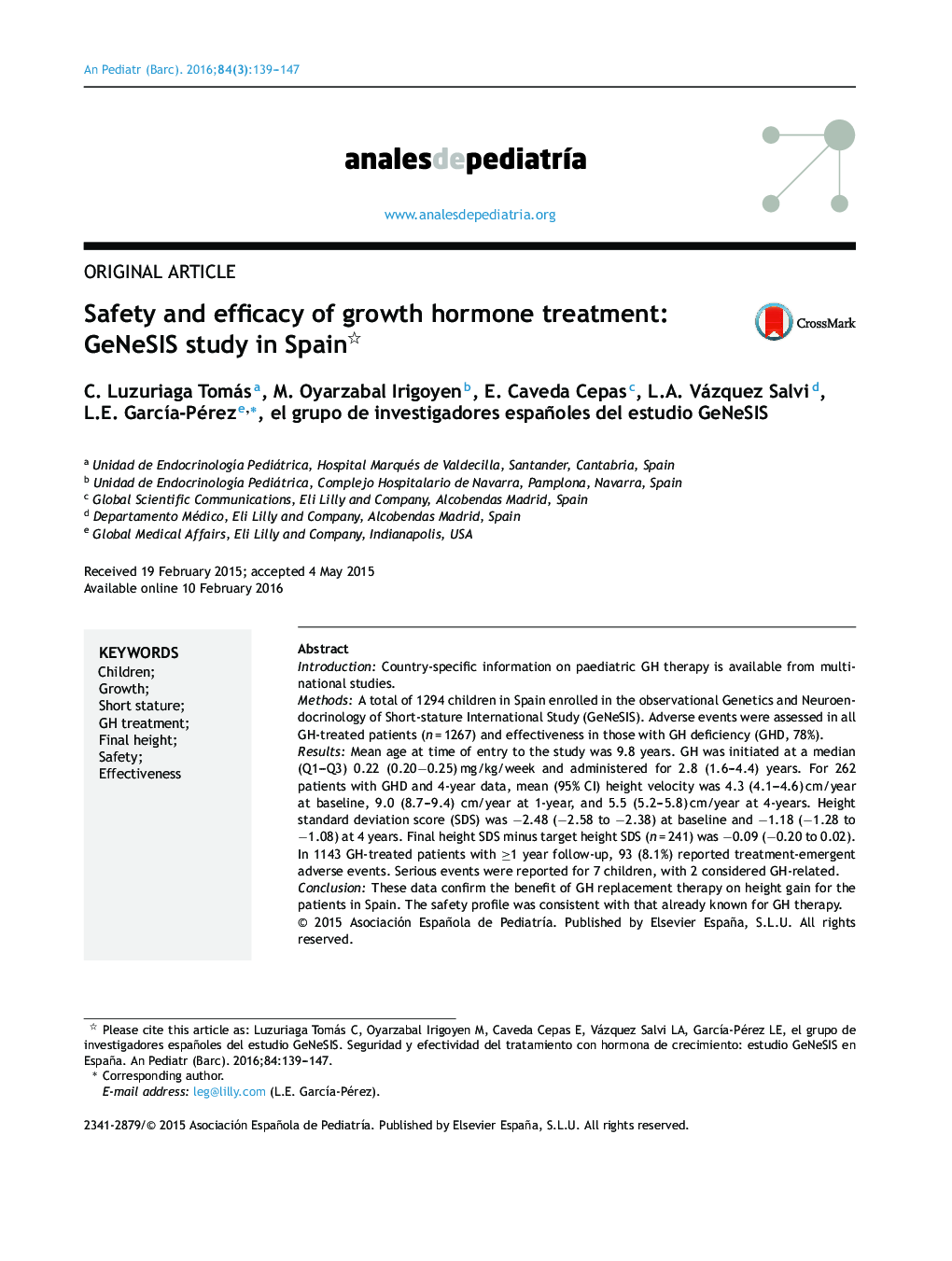| کد مقاله | کد نشریه | سال انتشار | مقاله انگلیسی | نسخه تمام متن |
|---|---|---|---|---|
| 4145029 | 1272582 | 2016 | 9 صفحه PDF | دانلود رایگان |
IntroductionCountry-specific information on paediatric GH therapy is available from multi-national studies.MethodsA total of 1294 children in Spain enrolled in the observational Genetics and Neuroendocrinology of Short-stature International Study (GeNeSIS). Adverse events were assessed in all GH-treated patients (n = 1267) and effectiveness in those with GH deficiency (GHD, 78%).ResultsMean age at time of entry to the study was 9.8 years. GH was initiated at a median (Q1–Q3) 0.22 (0.20−0.25) mg/kg/week and administered for 2.8 (1.6–4.4) years. For 262 patients with GHD and 4-year data, mean (95% CI) height velocity was 4.3 (4.1–4.6) cm/year at baseline, 9.0 (8.7–9.4) cm/year at 1-year, and 5.5 (5.2–5.8) cm/year at 4-years. Height standard deviation score (SDS) was −2.48 (−2.58 to −2.38) at baseline and −1.18 (−1.28 to −1.08) at 4 years. Final height SDS minus target height SDS (n = 241) was −0.09 (−0.20 to 0.02). In 1143 GH-treated patients with ≥1 year follow-up, 93 (8.1%) reported treatment-emergent adverse events. Serious events were reported for 7 children, with 2 considered GH-related.ConclusionThese data confirm the benefit of GH replacement therapy on height gain for the patients in Spain. The safety profile was consistent with that already known for GH therapy.
ResumenIntroducciónLa información específica de cada país sobre el tratamiento pediátrico con hormona de crecimiento (GH) proviene de estudios multinacionales.MétodosEn España, 1.294 niños participaron en el estudio internacional y observacional sobre genética y neuroendocrinología de la talla baja (GeNeSIS). En los pacientes tratados con GH (n = 1.267) se evaluaron los acontecimientos adversos. En aquellos con deficiencia de GH (DGH, 78%) también se evaluó la efectividad.ResultadosLa media de edad al inicio del estudio fue 9,8 años. La mediana (Q1-Q3) de duración del tratamiento fue 2,8 (1,6-4,4) años y la dosis inicial de GH 0,22 (0,20-0,25) mg/kg/semana. En 262 pacientes con DGH con datos a 4 años, la velocidad media (IC 95%) de crecimiento fue 4,3 (4,1 a 4,6) cm/año al inicio; 9,0 (8,7 a 9,4) cm/año tras un año y 5,5 (5,2 a 5,8) cm/año a los 4 años. La puntuación de desviación estándar (SDS) de talla fue —2,48 (—2,58 a —2,38) al inicio y −1,18 (−1,28 a −1,08) a los 4 años. La SDS de talla final menos la SDS de talla diana (n = 241) fue −0,09 (−0,20 a 0,02). De 1.143 pacientes tratados con GH con seguimiento ≥1 año, 93 (8,1%) comunicaron acontecimientos adversos surgidos durante el tratamiento. En 7 niños se comunicaron acontecimientos adversos graves, que en 2 casos se consideraron posiblemente relacionados con GH.ConclusiónLa terapia de sustitución con GH fue efectiva para el aumento de talla en los pacientes españoles. El perfil de seguridad fue acorde con el ya conocido para el fármaco.
Journal: Anales de Pediatría (English Edition) - Volume 84, Issue 3, March 2016, Pages 139–147
